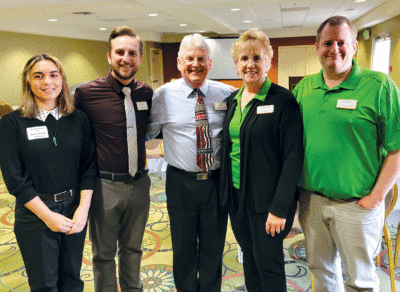By VERNON ROBISON
The Progress

Attendees at a pair of financial seminars held last week in Mesquite came away with the lowdown on the outlook for federal taxes in the near future, how it could affect their own assets, and a few suggestions on what to do about it.
There were two sessions of the same seminar; one on Tuesday, Feb. 21 and the other on Wednesday, Feb. 22; held at the Holiday Inn Express in Mesquite. The seminars were instructed by local financial advisor Jeff Bird of Financial Concepts in Mesquite. Admission to the seminars was free.
Bird opened each session by asking attendees what their own outlook is on taxes. He asked: Will they be going up or going down? Most everyone agreed that taxes would be rising in the future.
“I’m guessing that is why you are here,” Bird said. “Hopefully you can leave with some ideas on how to mitigate the potential for future tax increases.”
Bird began by talking about government spending. He pointed out that in the 12 month period after the outbreak of COVID-19, Congress passed a series of spending measures totalling $5.5 trillion.
“Those are big numbers and it is hard to visualize them,” Bird said.
He offered an illustration which began with imagining a single packet of $100 bills like a bank would order: bills stacked in a 1/2-inch bundle in the amount of $10,000. A block of a hundred of those little stacks, equalling $1 million, would fit into a briefcase, he said.
A standard shipping pallet full of those $100-bill packets would equal $100 million.
Ten of those pallets would amount to $1 billion.
To get to $1 trillion, however, it would take the equivalent of a football field-full of those same pallets, double-stacked, to contain that much money, he said.
“We spent 5 football fields of double-stacked pallets of $100 bills in just one year,” Bird said.
Bird then showed a detailed analysis of government spending over the past 100 years and illustrated how it affected taxes. Each time, after a period of high federal spending, there was an increase in taxes, he said.
“I can tell you right now that taxes are going to go up from here,” Bird said.
A tax reduction law passed in 2017 was not permanent, Bird instructed. It is expected to sunset in 2026. At that time, rates increase significantly across the board, he said.
“So we basically have a three-year window now, before that sunsets, when we actually have some of the lowest tax rates in history,” Bird said. “How can we use that to our advantage?”
Bird pointed out that people can’t decide whether they pay taxes or not, that is a given. But in this case, people can choose WHEN they pay taxes.
Bird said that most people have invested for retirement in tax-deferred accounts like IRAs, 401ks and others. These give a tax break in the year that the money is saved. “But all you’re doing with those accounts is kicking the tax bucket down the road when tax rates will be higher,” Bird said.
Bird instructed about another option that are “tax-free” accounts. On these, a person pays the taxes now, while rates are lower. Then when the saver is ready to withdraw the funds at retirement, the growth in the account comes out tax free.
“If you feel pretty certain that taxes are going up, then paying now essentially gives you a discount on taxes,” Bird said.
He explained that there are two types of accounts that allow for tax free growth and income: the Roth IRA and certain types of life insurance products.
He gave an example of a man at the age of 40 years old saving about $5,000 annually for 25 years. If this man uses a Roth IRA instead of a more traditional tax-deferred account, he would see a difference of more than $64,000 in after-tax income by paying the taxes up front rather than deferring them, Brid said.
Another example Bird used portrayed a 70-year-old retired woman who receives a fixed income from social security and is on a pension that is amply filling her needs. But she suddenly needs to pay for a new roof and doesn’t have the money to do it. She has enough in a tax deferred IRA account to pay for the roof. But as soon as she withdraws that money, she is taxed on it as regular income. That additional income puts her above her social security threshhold; requiring her to also pay taxes on her social security income too.
“That is bad news for her,” Bird said.
As an alternative, if the same woman had put the IRA money into an indexed universal life policy, she could borrow that money against the policy, Bird said. The IRS doesn’t recognize the loan as ordinary income and it doesn’t bump her over her threshold for social security.
Bird offered to sit down with attendees and other community members if they had questions on tax planning issues.
Attendees were treated to a meal after each seminar, brought in from local food vendors. A few lucky attendees received prizes and cash in a series of door-prize drawings at the seminar.
Bird concluded by stating that Financial Concepts would be offering another workshop on March 29 on the subject of legacy and estate planning.










